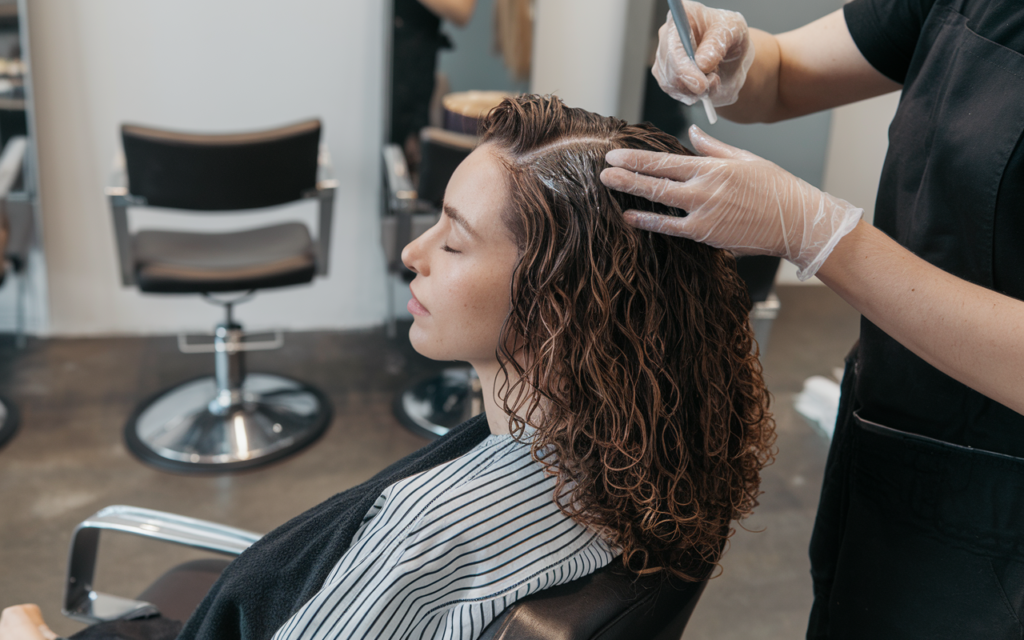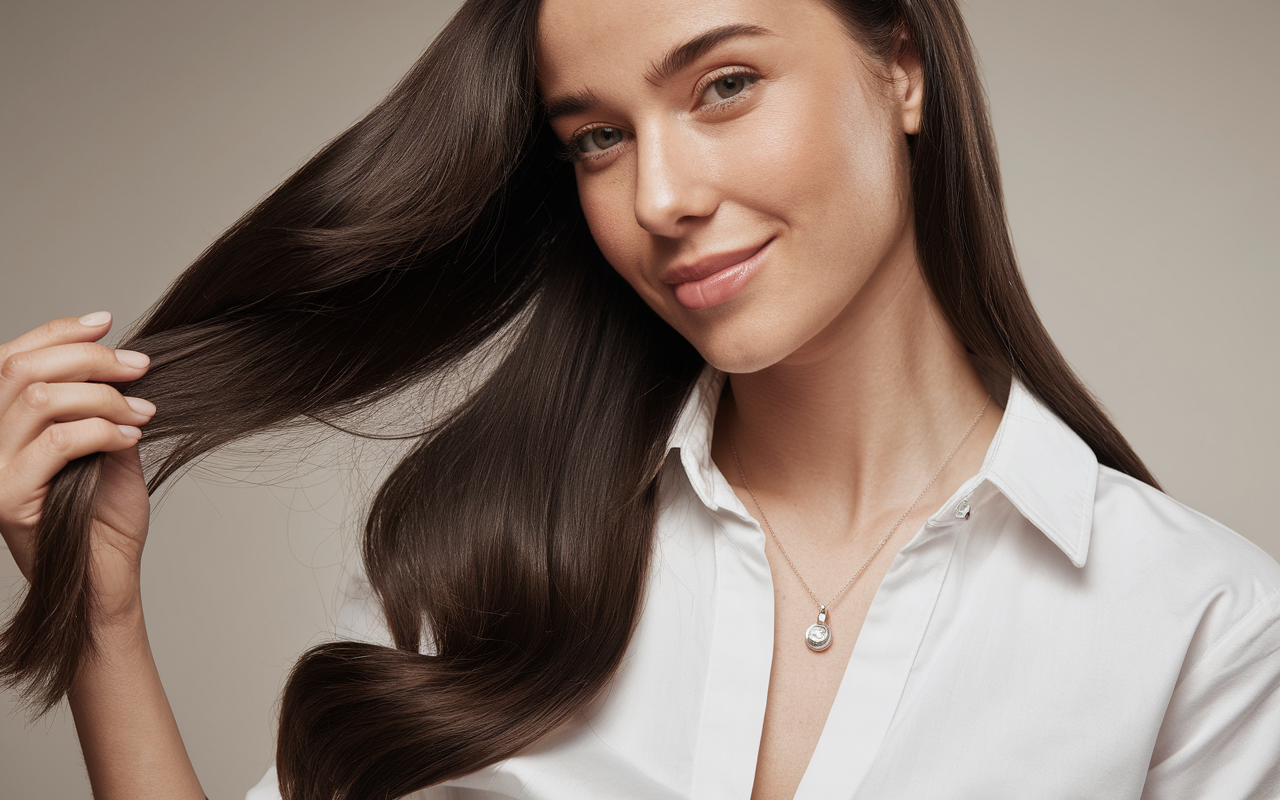Introduction
Frizzy hair is a common challenge faced by many people, regardless of hair type or texture. It often appears as unruly, dry, and puffy strands that refuse to lie flat, making hair appear less manageable and styled. Frizz occurs when the outer layer of the hair, known as the cuticle, is raised, allowing moisture to pass through and swell the strands. It results in a rough texture and an untamed look. Understanding the causes of frizz is the first step in finding effective treatments for frizzy hair.
An absence of dampness in the hair commonly brings about frizz. When hair becomes dry, it seeks moisture from the surrounding environment, which can cause the cuticle to open and create a frizzy appearance. Other factors contributing to frizz include humidity, excessive heat styling, chemical treatments, and using the wrong hair care products. Genetics also plays a role, as some people are more prone to frizz due to the natural structure of their hair.
The good news is that numerous treatments for frizzy hair can help restore its smoothness, shine, and manageability. By incorporating proper hair care practices and using targeted solutions, frizz can be effectively managed, leaving you with healthier and more beautiful hair.
Hydrating Hair Masks for Frizzy Hair
One of the most effective treatments for frizzy hair is the use of hydrating hair masks. These masks provide intense moisture and nourishment to the hair, helping to smooth the cuticle and reduce frizz. Hydrating hair masks are typically made with ingredients such as avocado, coconut oil, argan oil, and shea butter, all of which are known for their moisturizing properties.
Applying a hair mask once or twice a week can make a significant difference in the appearance and texture of your hair. For best results, choose a hair mask specifically designed for treating frizz. Apply the mask to clean damp hair, ensuring it covers every strand. Leave it on for the suggested time, generally 20-30 minutes, and wash completely. Regular use of hydrating masks not only reduces frizz but also improves overall hair health.

The Role of Sulfate-Free Shampoos in Reducing Frizz
Using the right shampoo is crucial when considering treatments for frizzy hair. Traditional shampoos often contain sulfates, which are harsh cleansing agents that can strip the hair of its natural oils. It can lead to dryness and make frizz worse. Switching to a sulfate-free shampoo can help maintain the hair’s natural moisture balance and reduce frizz.
Sulfate-free shampoos are gentle on the hair and scalp, providing effective cleansing without causing damage. They are particularly beneficial for individuals with curly or wavy hair, as these hair types are more prone to dryness and frizz. Look for shampoos enriched with hydrating ingredients such as glycerin, aloe vera, and coconut milk to combat frizz further.
Leave-In Conditioners and Serums for Frizz Control
Leave-in conditioners and serums are excellent treatments for frizzy hair, providing a lightweight solution to tame unruly strands. These products work by forming a protective barrier around the hair, locking in moisture and preventing humidity from causing frizz.
When applying a leave-in conditioner or serum, focus on the mid-lengths and ends of your hair, where frizz tends to be more pronounced. Try not to apply a lot of items close to the roots, as this can burden your hair. For best results, use these products on damp hair after washing and reapply as needed throughout the day to maintain smoothness and shine.
Keratin Treatments: A Long-Lasting Solution
Keratin treatments have become a popular choice for individuals seeking long-lasting treatments for frizzy hair. These salon medicines include applying a keratin-based formula to the hair, which is then fixed utilizing heat. Keratin is a protein naturally found in hair, and these treatments work by replenishing keratin levels to smooth the cuticle and reduce frizz.
The results of keratin treatments can last for several months, making them an excellent option for those looking for a semi-permanent solution. However, it’s important to note that keratin treatments require proper maintenance to prolong their effects. Use sulfate-free shampoos and conditioners to preserve the treatment and avoid exposing your hair to excessive heat or chlorine.

The Importance of Proper Hair Drying Techniques
How you dry your hair can significantly impact its frizz levels. One of the simplest treatments for frizzy hair involves adopting proper drying techniques. Using a regular towel to dry your hair can create friction, leading to frizz. Instead, opt for a microfiber towel or an old cotton T-shirt, which is gentler on the hair and helps reduce frizz.
Additionally, avoid vigorously rubbing your hair with a towel, as this can disrupt the cuticle and worsen frizz. All things being equal, tenderly smear or press the abundance of water from your hair. Allow your hair to air dry whenever possible, as excessive use of blow dryers can strip the hair of moisture and exacerbate frizz. If you need to use a blow dryer, always use a diffuser attachment and set the heat to low or medium to minimize damage.
Natural Oils: A Tried-and-True Remedy
Natural oils are among the oldest and most effective treatments for frizzy hair. Oils such as argan oil, coconut oil, and jojoba oil are rich in essential fatty acids and vitamins that nourish the hair and smooth the cuticle. These oils not only reduce frizz but also add shine and softness to the hair.
To use natural oils, apply a small amount to the palms of your hands and work it through your hair, focusing on the mid-lengths and ends. For deeper hydration, consider using an oil as a pre-shampoo treatment. Apply the oil generously to your hair and scalp, leave it on for at least 30 minutes, and then wash and condition as usual. Regular use of natural oils can transform dry, frizzy hair into smooth and manageable locks.
Heat Protection: A Vital Step in Frizz Prevention
Heat styling tools such as flat irons, curling wands, and blow dryers can be major contributors to frizz. Protecting your hair from heat damage is essential when considering treatments for frizzy hair. Heat-protectant sprays and creams act as a barrier between your hair and styling tools, reducing the risk of damage and frizz.
Before using any heat styling tool, apply a heat protectant product evenly throughout your hair. Look for formulas that contain silicone or polymers, as these ingredients coat the hair and shield it from high temperatures. Additionally, try to minimize the use of heat-styling tools and embrace natural hairstyles to prevent further damage.

Dietary and Lifestyle Changes for Healthier Hair
The state of your hair is firmly connected to your general well-being. Incorporating dietary and lifestyle changes can complement external treatments for frizzy hair. An eating routine plentiful in nutrients, minerals, and proteins upholds hair well-being from the inside. Include foods high in omega-3 fatty acids, biotin, and vitamin E, such as salmon, nuts, eggs, and leafy greens, to promote stronger and smoother hair.
Remaining hydrated is similarly significant, as water keeps up with the dampness balance in your hair. Regular exercise, adequate sleep, and managing stress levels also contribute to healthier hair. By taking care of your body, you can enhance the effectiveness of treatments for frizzy hair and achieve lasting results.
Professional Treatments and Advanced Options
For those seeking more intensive treatments for frizzy hair, professional options such as hair botox and Brazilian blowouts are worth considering. These treatments involve applying specialized formulas to the hair that smooth the cuticle, reduce frizz, and improve manageability. While these options can be costly, they offer long-lasting results and are ideal for individuals with severe frizz.
Hair botox, for example, is a deep conditioning treatment that replenishes lost nutrients and repairs damaged hair. Similarly, Brazilian blowouts use a keratin-based formula to create smooth and frizz-free hair. Both treatments require professional application and maintenance to ensure their longevity.
Conclusion: Embracing Smooth and Manageable Hair
Frizzy hair may be a common concern, but it is not insurmountable. By understanding the causes of frizz and exploring the wide range of treatments for curly hair, you can find solutions that work best for your hair type and lifestyle. Whether you opt for hydrating masks, sulfate-free shampoos, natural oils, or professional treatments, consistency and care are key to achieving smoother, healthier hair.
The journey to taming frizz requires patience and the right approach, but the results are well worth the effort. With the right treatments for frizzy hair, you can embrace a new level of confidence and enjoy the beauty of smooth, manageable locks.



